"In the Battle of Iraq, the United States and our allies have prevailed."
- George W. Bush
May 1, 2003
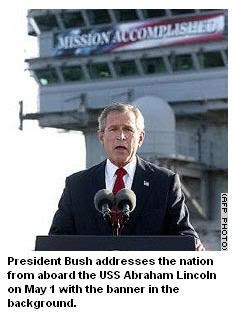
Mission Accomplished Clip (May 1, 2003)
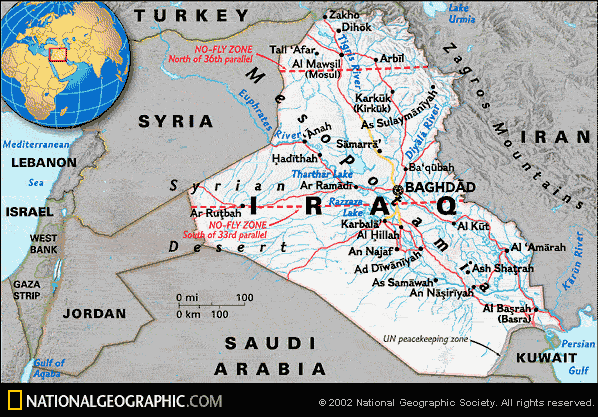

Four years later over 3,300 U.S. troops have been killed and many more have been wounded. Hundreds of thousands of Iraqis have been killed in the ongoing civil war that is ripping the country apart. On this anniversary of "Mission Accomplished"
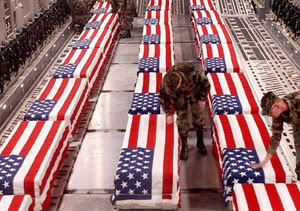
http://en.wikipedia.org/wiki/Mission_Accomplished
Mission Accomplished", a military phrase associated with completing a mission, is in recent years particularly associated with a sign displayed on the USS Abraham Lincoln as President George W. Bush addressed the United States on May 1, 2003.
Bush stated at the time that this was the end to major combat operations in Iraq. While this statement did coincide with an end to the conventional phase of the war, Bush's assertion — and the sign — became controversial after guerilla warfare in Iraq increased during the Iraqi insurgency. The vast majority of casualties, among both coalition and Iraqi combatants, and from Iraqi civilians, have occurred after the speech.
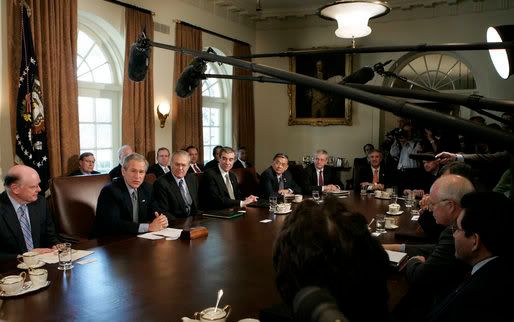
So, What Went Wrong?
http://www.time.com/time/magazine/article/0,9171,1101031006-490595,00.html
On May 1, off the coast of California, president George W. Bush landed in flying gear on the deck of the aircraft carrier U.S.S. Abraham Lincoln—which sported a banner reading mission accomplished—and said, "Major combat operations in Iraq have ended."
The war, said Bush, had been carried out "with a combination of precision and speed and boldness the enemy did not expect, and the world had not seen before."
But the mission wasn't accomplished then, and it still is not. The reconstruction of Iraq has proved far more difficult than any official assumed it would be. Since May 1, 170 U.S. soldiers have died in Iraq, as sporadic guerrilla attacks have continued. Two potential leaders of the new Iraq—Ayatollah Mohammed Baqir al-Hakim and Akila al-Hashimi, a member of the U.S.-appointed Governing Council in Iraq—have been assassinated. Also dead is Sergio Vieira de Mello, the U.N. chief representative in Iraq, who was killed when a bomb exploded at U.N. headquarters last month. After a second bombing last week near the building, U.N. Secretary-General Kofi Annan ordered a reduction in the size of the organization's mission—already much smaller than it had once been—for reasons of safety.
Over the long, hot Iraqi summer, frequent power cuts made life unbearable for millions, while the flow of oil, which the Administration had hoped would fund Iraq's reconstruction, was, on some days, less than half what it had been before the war. And despite five months of searching, the weapons of mass destruction (WMD), whose possession by Saddam Hussein had been the principal reason advanced by Bush for the war, are still nowhere to be found. "There are challenges greater than we anticipated," said a White House official last week, while insisting "In time, the benefits of our actions will be quite obvious."
The number of Americans to whom those benefits are obvious right now is in decline. In the latest Gallup poll, Bush's approval ratings dropped to 50%, the lowest since right before Sept. 11, 2001. Some critics of the Administration's hard-liners pull no punches. "It reminds me of Vietnam," says retired Marine General Anthony Zinni, who headed the U.S. Central Command from 1997 to 2000. "Here we have some strategic thinkers who have long wanted to invade Iraq. They saw an opportunity, and they used the imminence of the threat and the association with terrorism and the 9/11 emotions as a catalyst and justification. It's another Gulf of Tonkin."
On Capitol Hill, Bush's eye-popping supplementary budget request of $87 billion in the current fiscal year for military operations and reconstruction in Iraq and Afghanistan—which includes $20 billion in grants to rebuild Iraq—has left even Republicans gasping. As it becomes clear that there will not be a sudden influx of non-American troops into Iraq, the Pentagon is having to extend tours of duty there of regular soldiers and reservists. Bush's travails have invigorated the Democratic Party; all the Democrats running for the White House make criticism of Bush's record in Iraq a part of their pitch. And although few are brave enough to say it, other world leaders—most of whom opposed the war—can hardly hide their sense that the Bush Administration is getting what it deserves. When Bush spoke before the U.N. General Assembly last Tuesday, he faced an audience he has often described as having the enthusiasm of a "wax museum." The applause that greeted his speech was tepid, while that reserved for war opponent Jacques Chirac, the French President, was, at least by the U.N.'s decorous standards, positively thunderous.
In the speech, Bush said the U.S.-led coalition is "helping to improve the daily lives of the Iraqi people," rebuilding schools and reopening hospitals. The claim is well made. For most Iraqis, everyday life is steadily improving, helped by the onset of cooler weather. But the missteps and violence of the summer, and the realization that the U.S. and its allies will be paying for Iraq in blood and treasure for years, have altered America's politics and foreign policy, making it likely that the 2004 election will be competitive and practically ensuring that if the U.S. wants to embark on another adventure like the pre-emptive war in Iraq, it will do so virtually alone.
Those consequences flow from a series of flawed assumptions and decisions made before the war started—some based on resolute optimism, some based on naivete, and some that carried unfortunate unintended consequences. The Administration's leading members, said Democratic Senator Joseph Biden last week, "believed we would find an oil-rich, functioning country, that we'd be met by cheering crowds, that all we had to do was sweep out the top Baathist layers, implant our favorite exiles and watch democracy take root as the bulk of the troops returned home by Christmas." Allowing for Bidenesque hyperbole, that is not far off the mark. Bureaucratic infighting, wishful thinking and—at least according to his many rivals—an undue influence in Washington exerted by Ahmed Chalabi, the exile leader who is the darling of the neoconservative faction in Washington, contributed to a process by which the Bush Administration got Iraq wrong. Here's how:
WHAT WEAPONS?
Of all the miscalculations on Iraq, few have been as surprising as the inability to find real evidence of Saddam's supposed weapons of mass destruction. Pentagon officials say the 1,200-strong team led by cia weapons expert David Kay, whose interim report is expected soon, has not found any stockpiles of deadly chemical, biological or nuclear weapons. So far, says an Administration official, "they have come across only parts and pieces and things—and that's about the best they are going to come up with." Members of Bush's senior national security team, says this official, "are as surprised as anyone—they really thought that it would be a lot easier to find, identify and show the world everything that was there." Iraqi sources involved in Saddam's WMD programs, meanwhile, insist that there was nothing to find; all weapons, they say, were destroyed long ago (see following story). For Bush, the failure to find WMD has been a source of political embarrassment. For his principal ally, British Prime Minister Tony Blair, it has been a disaster, as allegations that his government exaggerated a nonexistent threat have sapped confidence in his leadership.
Critics insist that Bush and Blair stretched the available intelligence on WMD until it fit their predetermined decision to go to war. But that can't be the whole story. There is no doubt many British and U.S. officials really believed that Saddam had at least chemical and biological weapons—the British government, certainly, would never have taken the risk of waging an unpopular war if it had genuinely thought there was nothing deadly to be found in Iraq. And in their conviction that Saddam was hiding something, Bush and Blair were not alone. Top members of Bill Clinton's Administration were also convinced that Saddam had WMD programs, and in an interview with Time in February, even Chirac said it was "probable" that Iraq had chemical and biological weapons. U.N. weapons inspectors had long said that Iraq had not accounted for all the WMD discovered in the 1990s.
Why were so many people so sure that Saddam had WMD? In part, of course, because he did once have them—and until challenged by U.N. inspectors after the first Gulf War had tried to conceal them. There may, however, have been another reason: Saddam himself apparently thought he had them. Sources tell Time that Western intelligence intercepted communications from Saddam that indicated he was taking a keen interest in the progress of ongoing WMD programs. It may be that evidence of such programs will yet turn up. Or possibly Saddam may have been duped by his own scientists, who didn't tell him their work on WMD was not getting far. (It would have been a brave Iraqi who crossed Saddam on that point.) Alternatively, in the hall of mirrors that was Iraq, Saddam may have been trying to fool everyone into thinking that he had something he hadn't. But if the assumption that Saddam had deadly weapons looks, at least for now, to have been mistaken, it was to an extent understandable.
VICTORY WITHOUT PACIFICATION
The fruitless hunt for WMD has not cost American lives. The failure to understand that the war was not over—and in some ways, had barely begun—when Bush stood on the deck of the Abraham Lincoln, has. The war that was fought in Iraq—with a swift march from the south to Baghdad—was not the war that Pentagon planners had anticipated.
Right up to a few weeks before the start of hostilities, plans had called for the 4th Infantry Division to advance from Turkey through northern Iraq. Administration officials, especially Deputy Secretary of Defense Paul Wolfowitz, who led the negotiations with Ankara, had believed that Turkey would support the U.S. But the prospect of war in Iraq was deeply unpopular in Turkey, and on March 1, the Turkish parliament, dominated by the Islamist A.K. (Justice and Development) Party, turned the U.S. down.
Diplomats and observers in Ankara allocate responsibility for the fiasco in many ways: some blame inexperienced A.K. ministers who overplayed their hand with the U.S., while others point the finger at Wolfowitz, who, say his critics, never understood that with the election of the A.K., military and secular leaders with strong ties to the U.S. no longer monopolized power. Says Emin Sirin, an A.K. parliamentary deputy and Istanbul businessman: "The Americans thought that if you talk to two or three people, you have Turkey in your hands. The whole system has changed, and they didn't appreciate that."
Whoever is to blame, the Turkish mess made it harder to fight the war. With a substantial force coming down from Turkey, there was a chance—though no certainty—of pacifying the "Sunni triangle" to the north and west of Baghdad, including Saddam's hometown of Tikrit. Instead, Iraqi fighters loyal to Saddam left Baghdad and went home, where, motivated by nationalism and tribal loyalties, they could regroup and plan attacks on American forces. It was not until June—in Operations Desert Scorpion and Peninsula Strike—that the fight was taken to them. One battle, for the town of Dululiyah, north of Baghdad, involved 4,000 U.S. soldiers.
The speed of the U.S. advance from the south, coupled with Defense Secretary Donald Rumsfeld's determination that the U.S. invading force should be as small as possible, had a further consequence. When the war was over, there were not enough U.S. troops to detain and disarm Iraqi fighters or maintain security in the cities. Governmental authority in Iraq collapsed, leaving the U.S. forces, already stretched thin, to do everything from guarding banks to hunting down guerrillas. "The Americans thought they would come and just slot in at the top," says Entifadh Qanbar, a spokesman in Baghdad for Chalabi's Iraqi National Congress (I.N.C.). "But the whole government basically melted away, and they weren't ready for that."
That failure was compounded by the disastrous decision by U.S. proconsul L. Paul (Jerry) Bremer in May to disband the Iraqi army, which put thousands of armed men on the streets with no pay and no reason to support the Americans. In December a blue-ribbon commission created by the Council on Foreign Relations and the James A. Baker III Institute for Public Policy of Rice University had argued the opposite case. The Iraqi army, the panel said, "could serve as a guarantor of peace and stability if it is retrained in part for constabulary duty and internal security mission"—something that has only just been started. Ron Adams is a retired Army lieutenant-general who acted as deputy to retired Army General Jay Garner, chief of the reconstruction effort in its first months. Says Adams: "There were some of us saying, right from the get-go, 'We think there's a troops-to-task mismatch here—I'm not sure there are enough troops to maintain security.'" Ibrahim al-Janabi, of the Iraqi National Accord (i.n.a.), says that in early March, i.n.a. leader Ayad Alawi, who now sits on the Governing Council, met with top U.S. officials, including Rumsfeld, National Security Adviser Condoleezza Rice and Secretary of State Colin Powell, to recommend that the U.S. keep the Iraqi army and police force intact to maintain security. Chalabi, for his part, had argued for a U.S.-trained, 15,000-strong military-police force to keep the peace after the collapse of Saddam's regime. "It would have made all the difference in the world," he says. But U.S. policymakers, claims Chalabi, "didn't listen to us at all."
TOO MANY COOKS
That Chalabi thinks he was not listened to by U.S. officials will produce a hollow laugh in both Washington and Iraq. For his opponents in Iraq, the chaos over the summer can be laid at Chalabi's door. "I think the Americans relied on information they got from Iraqis outside the country, especially Chalabi," says Rabiah Mohammed al-Habib, a prominent tribal prince in Iraq. "These people simply wanted military intervention." Sometimes unfairly, Chalabi is blamed for encouraging his friends in Washington to think that an invasion would be a breeze and reconstructing Iraq not much harder.
Chalabi's longstanding links to top officials in the Administration are legendary. He considers Wolfowitz a good friend and the night after the statue of Saddam fell in Baghdad spoke with 12 Senators from his base in Nasiriyah, Iraq. One I.N.C. official says that in the run-up to the war, Francis Brooke, Chalabi's point man in Washington, spoke once a week to Bill Luti, who ran the Pentagon's Iraq policy from the Special Plans Office. Brooke also had access to John Hannah, who runs the Middle East desk in Vice President Dick Cheney's office. "From Day One, we were having discussions with the Bush Administration," says Brooke. "Our views were well known."
And they were influential. A year ago, Tom Warrick, a career State Department official, assembled a Future of Iraq project that brought together more than 200 Iraqis in working groups with U.S. officials observing. The I.N.C. joined only one of the working groups. Chalabi's people dismiss the whole exercise as absurd. "We just thought it was a joke," says an I.N.C. official. Says another: "The idea that there was a well-organized project at the State Department that was producing sophisticated postwar planning is ridiculous. The scholarship was at the high school-essay level." Others believe I.N.C. and its allies in the Administration already knew what they wanted to do and undermined an effort to unite Iraqis of all persuasions around a common project. "What happened to all that work we put in?" says Laith Kubba, an Iraqi at Washington's National Endowment for Democracy. For whatever reason, the Future of Iraq project was pretty much ignored. "The White House barely knew about it," says a former official involved in postwar planning.
In fact, by September 2002, the White House had its own exercise under way. In August of that year, the Senate Foreign Relations Committee had held contentious hearings on Iraq, focusing on the apparent lack of any postconflict preparation. Just after Labor Day, Rice summoned her top staff to an evening meeting and set up four working groups to try to coordinate inter-agency squabbling. State, as usual, was trying to find a multilateral approach to Iraq and to boost the status of opponents to the regime inside Iraq. The Defense Department was happy to go it alone and rely on its favored Iraqi exiles. The cia, meanwhile, was trying to warn that governing Iraq after the war would not be as easy as some of the exiles had thought.
Rice's working groups failed on two counts. First, they never succeeded in getting State and the Pentagon on the same page. In January Bush assigned responsibility for postwar Iraq to the Pentagon—to which Garner reported—which soon made it plain that everyone else would play a secondary role. But, just as important, the Rice group responsible for postwar planning, led by Elliott Abrams from the National Security Council and Robin Cleveland from the Office of Management and Budget, woefully underestimated the cost of reconstructing Iraq. It was the work of that group that in large part led omb director Mitch Daniels to estimate a year ago that the total price tag of the Iraq adventure would be just $50 million to $60 million, a range Bush surely now wishes were true. The failure to get the costs right turned on two false assumptions: that Iraq's infrastructure was in relatively decent shape and that Iraqi oil exports would pay for much of the country's reconstruction. But Iraq's electricity grid is barely functional, and its oil installations aren't much better. "The oil refineries can't be repaired, in my opinion," said Republican Senator Lindsey Graham after a visit to Iraq last month. "They have to be replaced."
How did the Administration get its cost estimates so wrong? The conventional explanation—offered last week by Marine General Peter Pace, vice chairman of the Joint Chiefs of Staff—is that "until you get in on the ground, you don't have a thorough understanding of how degraded those systems became." But Iraq isn't on the dark side of the moon. "There were plenty of people in and out of Iraq—inspectors and many other potential sources of information about the state of Iraq's infrastructure," says Ralph Peters, a retired Army intelligence officer. "This was a whopping intelligence failure."
Peters has a point. A report on Iraq to the U.N. Security Council last year stated: "The deficit in electric power as a result of damage inflicted and nonavailability of spare parts and equipment for maintenance is a serious problem throughout the country. The network continues to deteriorate." The Council on Foreign Relations/Rice University study estimated that "rebuilding Iraq's electrical power infrastructure could cost $20 billion to restore its pre-1990 capacity." Many oil experts spent last winter publicly debunking the Administration's assumptions on oil, pointing out that 12 years of sanctions had left the industry in a terrible state. "There has been a great deal of wishful thinking about Iraqi oil," said the Council on Foreign Relations/Rice University report, noting that the oil sector was "being held together by 'Band-Aids'" and estimating that the Iraqi industry needed $30 billion to $40 billion to rehabilitate active wells and develop new fields. "Put simply," the report continued, "we do not anticipate a bonanza." According to Department of Energy figures, Iraq is pumping only about 1.65 million bbl. of oil a day now, compared with 2.8 million before the war and 3.5 million before 1990, which makes that revelation something of an understatement.
LIBERATORS VS. OCCUPIERS
Administration officials insist that U.S. forces were welcomed into Iraq as liberators—which, for a week or so, they were—and that there is still gratitude for their presence now—which is more debatable. In a society that has been as repressed as Iraq's for 50 years, true popular sentiment is hard to judge. Iraq is still getting used to freedom and its boundless possibilities. After the war was over, many stores in Baghdad did not take up their shutters, though it was safe for them to do so. "We're waiting for someone to tell us to open," said an elderly shopkeeper. But whatever horrors they have suffered, Iraq's proud citizens cannot be expected to be happy with the reality of foreign soldiers on their streets. "There is a real nationalistic feeling here," says a European diplomat who has worked in Baghdad for two years. "It is a real country, and it has a real national feeling that it is being occupied. And even if they don't know who will lead them tomorrow, they don't want to be occupied." Kasim al-Sahlani, a senior member of the Dawa Party, a moderate Islamic party that opposed Saddam from within, complains that Bremer said Iraqis were not yet ready to lead the country. "The Iraqis are civilized people," he says, "but Paul Bremer's words make us sound like children."
Joe Fillmore, a contract translator with the 4th Infantry Division in Tikrit, agrees that resentment is deepening. Things may look better on the surface, he says, but there is a growing frustration with the occupation. "The town is divided into two parts," he says. "Those who hate us and those who don't mind us but want us to go." Even Chalabi, who is among the most pro-American people in Iraq, says, "When the U.S. said we are not liberators, we are an occupation force, the views of people changed."
Part of the difficulty is simply cultural. "If an Iraqi policeman stops someone on the street and asks them politely to do something," says al-Janabi of the I.N.A, "that person will be ready to be a ring on the policeman's finger. But if you shout at him like the Americans do and hurt his dignity—he will hate you." In Baghdad a U.S. special-forces officer sadly agrees. "We should have been culturally sensitive," he says. In places like Fallujah, he argues, "we should never have gone into people's houses. Saddam's soldiers never went into houses—they would negotiate and settle things with money. We don't understand how things work around here." That is an honest assessment, not an indictment. There is not the slightest reason in the world why 19-year-old boys from Kansas and Kentucky should know how to deal with Iraqi sensitivities—to get Iraq right—and it is unfair to condemn them for failing to do so. But it is not unfair to judge those who got Iraq wrong and thought five months ago that the mission of those young men, now hunkering down for a longer tour of duty than they ever expected, was over. It is not.
—Reported by Brian Bennett, Simon Robinson, Vivienne Walt and Michael Ware/Baghdad, J.F.O. McAllister/London, Andrew Purvis/Vienna and Timothy J. Burger, Massimo Calabresi, Matthew Cooper, Viveca Novak, Mark Thompson, Douglas Waller, Michael Weisskopf and Adam Zagorin/Washington
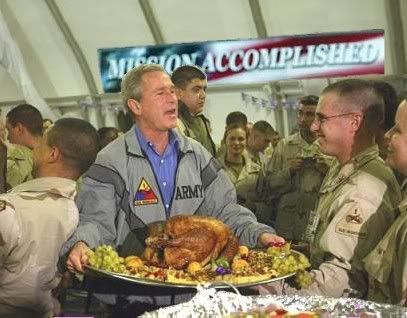
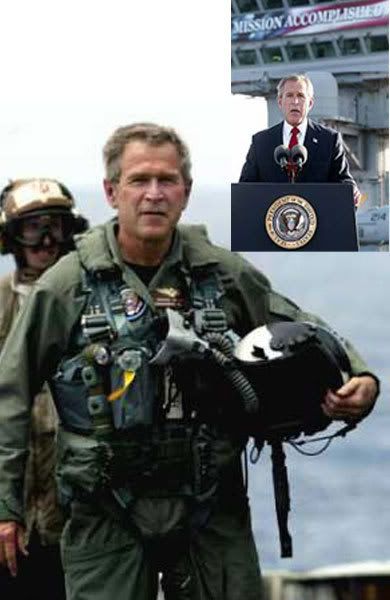
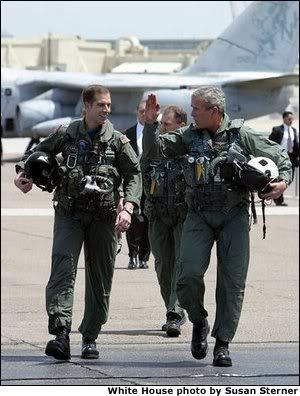
President Bush Announces Major Combat Operations in Iraq Have Ended
Remarks by the President from the USS Abraham Lincoln
At Sea Off the Coast of San Diego, California
http://www.whitehouse.gov/news/releases/2003/05/20030501-15.html
THE PRESIDENT: Thank you all very much. Admiral Kelly, Captain Card, officers and sailors of the USS Abraham Lincoln, my fellow Americans: Major combat operations in Iraq have ended. In the battle of Iraq, the United States and our allies have prevailed. (Applause.) And now our coalition is engaged in securing and reconstructing that country.
In this battle, we have fought for the cause of liberty, and for the peace of the world. Our nation and our coalition are proud of this accomplishment -- yet, it is you, the members of the United States military, who achieved it. Your courage, your willingness to face danger for your country and for each other, made this day possible. Because of you, our nation is more secure. Because of you, the tyrant has fallen, and Iraq is free. (Applause.)
Operation Iraqi Freedom was carried out with a combination of precision and speed and boldness the enemy did not expect, and the world had not seen before. From distant bases or ships at sea, we sent planes and missiles that could destroy an enemy division, or strike a single bunker. Marines and soldiers charged to Baghdad across 350 miles of hostile ground, in one of the swiftest advances of heavy arms in history. You have shown the world the skill and the might of the American Armed Forces.
This nation thanks all the members of our coalition who joined in a noble cause. We thank the Armed Forces of the United Kingdom, Australia, and Poland, who shared in the hardships of war. We thank all the citizens of Iraq who welcomed our troops and joined in the liberation of their own country. And tonight, I have a special word for Secretary Rumsfeld, for General Franks, and for all the men and women who wear the uniform of the United States: America is grateful for a job well done. (Applause.)
The character of our military through history -- the daring of Normandy, the fierce courage of Iwo Jima, the decency and idealism that turned enemies into allies -- is fully present in this generation. When Iraqi civilians looked into the faces of our servicemen and women, they saw strength and kindness and goodwill. When I look at the members of the United States military, I see the best of our country, and I'm honored to be your Commander-in-Chief. (Applause.)
In the images of falling statues, we have witnessed the arrival of a new era. For a hundred of years of war, culminating in the nuclear age, military technology was designed and deployed to inflict casualties on an ever-growing scale. In defeating Nazi Germany and Imperial Japan, Allied forces destroyed entire cities, while enemy leaders who started the conflict were safe until the final days. Military power was used to end a regime by breaking a nation.
Today, we have the greater power to free a nation by breaking a dangerous and aggressive regime. With new tactics and precision weapons, we can achieve military objectives without directing violence against civilians. No device of man can remove the tragedy from war; yet it is a great moral advance when the guilty have far more to fear from war than the innocent. (Applause.)
In the images of celebrating Iraqis, we have also seen the ageless appeal of human freedom. Decades of lies and intimidation could not make the Iraqi people love their oppressors or desire their own enslavement. Men and women in every culture need liberty like they need food and water and air. Everywhere that freedom arrives, humanity rejoices; and everywhere that freedom stirs, let tyrants fear. (Applause.)
We have difficult work to do in Iraq. We're bringing order to parts of that country that remain dangerous. We're pursuing and finding leaders of the old regime, who will be held to account for their crimes. We've begun the search for hidden chemical and biological weapons and already know of hundreds of sites that will be investigated. We're helping to rebuild Iraq, where the dictator built palaces for himself, instead of hospitals and schools. And we will stand with the new leaders of Iraq as they establish a government of, by, and for the Iraqi people. (Applause.)
The transition from dictatorship to democracy will take time, but it is worth every effort. Our coalition will stay until our work is done. Then we will leave, and we will leave behind a free Iraq. (Applause.)
The battle of Iraq is one victory in a war on terror that began on September the 11, 2001 -- and still goes on. That terrible morning, 19 evil men -- the shock troops of a hateful ideology -- gave America and the civilized world a glimpse of their ambitions. They imagined, in the words of one terrorist, that September the 11th would be the "beginning of the end of America." By seeking to turn our cities into killing fields, terrorists and their allies believed that they could destroy this nation's resolve, and force our retreat from the world. They have failed. (Applause.)
In the battle of Afghanistan, we destroyed the Taliban, many terrorists, and the camps where they trained. We continue to help the Afghan people lay roads, restore hospitals, and educate all of their children. Yet we also have dangerous work to complete. As I speak, a Special Operations task force, led by the 82nd Airborne, is on the trail of the terrorists and those who seek to undermine the free government of Afghanistan. America and our coalition will finish what we have begun. (Applause.)
From Pakistan to the Philippines to the Horn of Africa, we are hunting down al Qaeda killers. Nineteen months ago, I pledged that the terrorists would not escape the patient justice of the United States. And as of tonight, nearly one-half of al Qaeda's senior operatives have been captured or killed. (Applause.)
The liberation of Iraq is a crucial advance in the campaign against terror. We've removed an ally of al Qaeda, and cut off a source of terrorist funding. And this much is certain: No terrorist network will gain weapons of mass destruction from the Iraqi regime, because the regime is no more. (Applause.)
In these 19 months that changed the world, our actions have been focused and deliberate and proportionate to the offense. We have not forgotten the victims of September the 11th -- the last phone calls, the cold murder of children, the searches in the rubble. With those attacks, the terrorists and their supporters declared war on the United States. And war is what they got. (Applause.)
Our war against terror is proceeding according to principles that I have made clear to all: Any person involved in committing or planning terrorist attacks against the American people becomes an enemy of this country, and a target of American justice. (Applause.)
Any person, organization, or government that supports, protects, or harbors terrorists is complicit in the murder of the innocent, and equally guilty of terrorist crimes.
Any outlaw regime that has ties to terrorist groups and seeks or possesses weapons of mass destruction is a grave danger to the civilized world -- and will be confronted. (Applause.)
And anyone in the world, including the Arab world, who works and sacrifices for freedom has a loyal friend in the United States of America. (Applause.)
Our commitment to liberty is America's tradition -- declared at our founding; affirmed in Franklin Roosevelt's Four Freedoms; asserted in the Truman Doctrine and in Ronald Reagan's challenge to an evil empire. We are committed to freedom in Afghanistan, in Iraq, and in a peaceful Palestine. The advance of freedom is the surest strategy to undermine the appeal of terror in the world. Where freedom takes hold, hatred gives way to hope. When freedom takes hold, men and women turn to the peaceful pursuit of a better life. American values and American interests lead in the same direction: We stand for human liberty. (Applause.)
The United States upholds these principles of security and freedom in many ways -- with all the tools of diplomacy, law enforcement, intelligence, and finance. We're working with a broad coalition of nations that understand the threat and our shared responsibility to meet it. The use of force has been -- and remains -- our last resort. Yet all can know, friend and foe alike, that our nation has a mission: We will answer threats to our security, and we will defend the peace. (Applause.)
Our mission continues. Al Qaeda is wounded, not destroyed. The scattered cells of the terrorist network still operate in many nations, and we know from daily intelligence that they continue to plot against free people. The proliferation of deadly weapons remains a serious danger. The enemies of freedom are not idle, and neither are we. Our government has taken unprecedented measures to defend the homeland. And we will continue to hunt down the enemy before he can strike. (Applause.)
The war on terror is not over; yet it is not endless. We do not know the day of final victory, but we have seen the turning of the tide. No act of the terrorists will change our purpose, or weaken our resolve, or alter their fate. Their cause is lost. Free nations will press on to victory. (Applause.)
Other nations in history have fought in foreign lands and remained to occupy and exploit. Americans, following a battle, want nothing more than to return home. And that is your direction tonight. (Applause.) After service in the Afghan -- and Iraqi theaters of war -- after 100,000 miles, on the longest carrier deployment in recent history, you are homeward bound. (Applause.) Some of you will see new family members for the first time -- 150 babies were born while their fathers were on the Lincoln. Your families are proud of you, and your nation will welcome you. (Applause.)
We are mindful, as well, that some good men and women are not making the journey home. One of those who fell, Corporal Jason Mileo, spoke to his parents five days before his death. Jason's father said, "He called us from the center of Baghdad, not to brag, but to tell us he loved us. Our son was a soldier."
Every name, every life is a loss to our military, to our nation, and to the loved ones who grieve. There's no
homecoming for these families. Yet we pray, in God's time, their reunion will come.
Those we lost were last seen on duty. Their final act on this Earth was to fight a great evil and bring liberty to others. All of you -- all in this generation of our military -- have taken up the highest calling of history. You're defending your country, and protecting the innocent from harm. And wherever you go, you carry a message of hope -- a message that is ancient and ever new. In the words of the prophet Isaiah, "To the captives, 'come out,' -- and to those in darkness, 'be free.'"
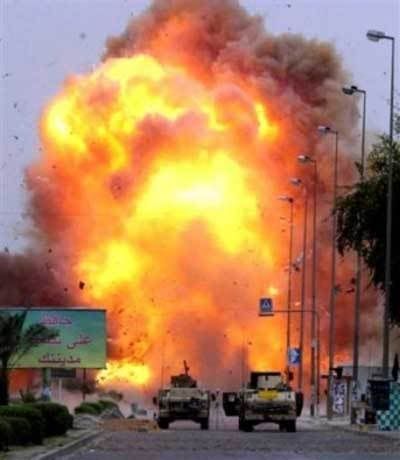
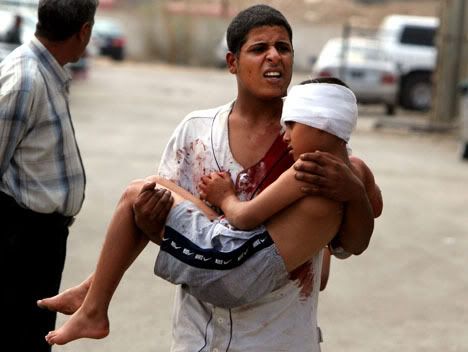
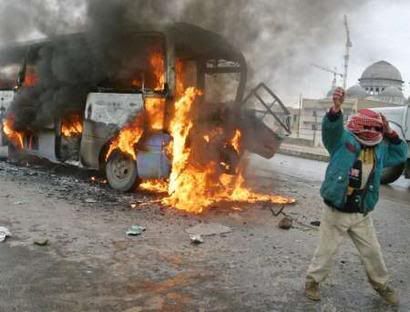
Bush's mission accomplished speech anniversary
http://www.wbko.com/news/headlines/7271436.html
It was four years ago today that President Bush gave his so-called mission accomplished speech aboard the USS Abraham Lincoln.
Bush is spending that anniversary by heading to US Central Command headquarters to meet with commanders running the Iraq war.
Bush never used the words mission accomplished, but that was the banner he spoke under. And Bush used the speech to declare an end to major combat in Iraq.
The anniversary coincides with the day that congress sends the president a funding bill that would order troops to begin withdrawing later this year. It's expected Bush will veto the then meet with congressional leaders on how to resolve the deadlock over funding for the war.
The White House said the president doesn't intend to mention the anniversary during his visit to US Central Command and said it's just coincidence they're meeting today.

Leading Dems seize on 'mission accomplished' anniversary
John Edwards is using today's fourth anniversary of President Bush's "mission accomplished" speech on the deck of the USS Abraham Lincoln to help solicit signatures for an online petition telling Congress "don't back down to Bush" over funding for the Iraq War.
http://blogs.usatoday.com/onpolitics/2007/05/leading_dems_se.html
Sen. Barack Obama, D-Ill., has released a statement timed for today that says, in part, that:
"The majority of the American people and their Congress now agree that there is no military solution to the conflict in Iraq, and that the best way to pressure the warring factions to reach a political settlement that can end this war is still a phased withdrawal of American forces with the goal of removing all combat brigades from Iraq by March 30th, 2008. It is time to end this war so we can bring our troops home and redeploy our forces to help fight the broader struggle against terrorism and other threats of this new century."
And the other top Democratic presidential contender (according to polls), Sen. Hillary Rodham Clinton of New York, says in a statement that: "Never before in our history has a president said 'mission accomplished' when the mission had barely begun. Never before has a president landed on the deck of an aircraft carrier to proclaim the end of major combat operations to a war that rages on four years later. Never before has a president pulled a political stunt when so many American lives were and remain in harm's way. ... America is ready for a president who will respect our Armed Forces by properly planning for the missions we ask our troops to undertake. America is ready to end this war and when I am president, that's exactly what I'll do.
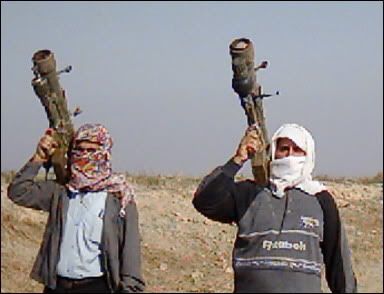
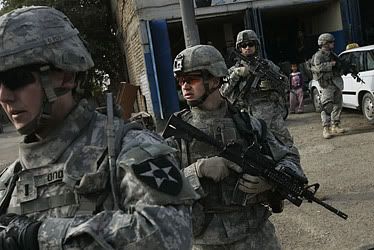
Death toll in Iraq at 3,351
http://www.herald-dispatch.com/apps/pbcs.dll/article?AID=/20070501/NEWS01/705010345/1001/NEWS10
U.S. military deaths in Iraq at 3,351 Monday, according to count by The Associated Press
As of Monday, April 30, 2007, at least 3,351 members of the U.S. military have died since the beginning of the Iraq war in March 2003, according to an Associated Press count. The figure includes seven military civilians. At least 2,723 died as a result of hostile action, according to the military's numbers
The AP count is nine higher than the Defense Department's tally, last updated Monday at 10 a.m. EDT.
The British military has reported 146 deaths; Italy, 33; Ukraine, 18; Poland, 20; Bulgaria, 13; Spain, 11; Denmark, six; El Salvador, five; Slovakia, four; Latvia, three; Estonia, Netherlands, Thailand, two each; and Australia, Hungary, Kazakhstan, Romania, one death each.
------
The latest deaths reported by the military:
-- Three soldiers were killed Sunday by a roadside bomb in eastern Baghdad.
-- A soldier was killed Saturday by small-arms fire in eastern Baghdad.
-- A Marine was killed Sunday in Anbar province.
------
The latest identifications reported by the military:
-- Marine Sgt. Peter Woodall, 25, Sarasota, Fla.; died Friday in combat in Anbar province; assigned to the 8th Engineer Support Battalion, 2nd Marine Logistics Group, II Marine Expeditionary Force, Camp Lejeune, N.C.
-- Army Pfc. Nicholas E. Riehl, 21, Shiocton, Wis.; died Friday in Fallujah when an explosive detonated near his unit; assigned to the 5th Squadron, 7th Cavalry Regiment, 1st Brigade Combat Team, 3rd Infantry Division, Fort Stewart, Ga.
-- Marine Cpl. Christopher Degiovine, 25, Lone Tree, Colo.; died Thursday in combat in Anbar; assigned to the 2nd Assault Amphibian Battalion, 2nd Marine Division, II Marine Expeditionary Force, Camp Lejeune, N.C.
-- Army Spc. Eddie D. Tamez, 21, Galveston, Texas; died Friday in Fallujah when an explosive detonated near his vehicle; assigned to the 5th Squadron, 7th Cavalry Regiment, 1st Brigade Combat Team, 3rd Infantry Division, Fort Stewart, Ga.
-- Army Pfc. David A. Kirkpatrick, 20, Upland, Ind.; died Friday in Fallujah when an explosive detonated near his vehicle; assigned to the 5th Squadron, 7th Cavalry Regiment, 1st Brigade Combat Team, 3rd Infantry Division, Fort Stewart, Ga.
-- Marine Sgt. William J. Callahan, 28, South Easton, Mass.; died Friday in combat in Anbar province; assigned to the 8th Engineer Support Battalion, 2nd Marine Logistics Group, II Marine Expeditionary Force, Camp Lejeune, N.C.
-- Army Sgt. Michael R. Hullender, 29, Little Falls, N.J.; died Saturday in Iskandariyah when an explosive detonated near his unit; assigned to the 1st Battalion, 501st Airborne Infantry Regiment, 4th Brigade Combat Team, 25th Infantry Division, Fort Richardson, Alaska.
-- Marine 1st Lt. Travis L. Manion, 26, Doylestown, Pa.; died Sunday in combat in Anbar province; assigned to the 1st Reconnaissance Battalion, 1st Marine Division, I Marine Expeditionary Force, Camp Pendleton, Calif.
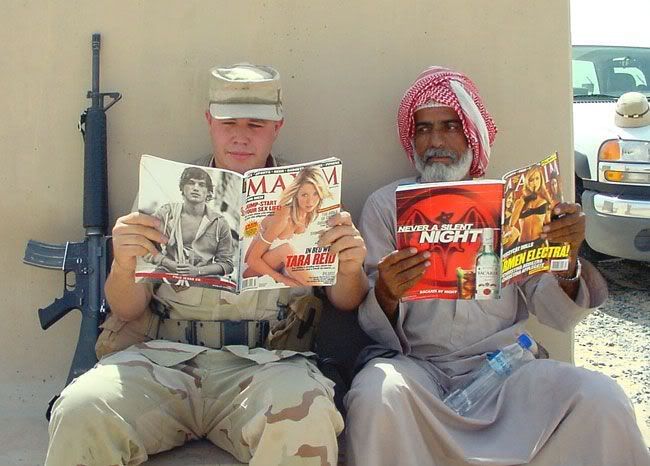
Misssion Accomplished
http://www.globalresearch.ca/index.php?context=viewArticle&code=ARB20070501&articleId=5535
Forty eight blood soaked months later, what exactly has been accomplished?
* Possibly as many as one million Iraqi dead, four million fled or displaced internally. The largest exodus since the establisment of the State of Israel in 1948.
* The erasing of the history, monuments, archeological sites of the Cradle of Civilisation.
* The kidnapping and lynching of the President and members of the legitimate government.
* The slaughter of the President's sons and grandson.
* One hundred journalists and thirty seven support workers killed. A figure in order of magnitude higher than any war zone on earth (shoot the
messengers of this illegal disaster?) It seemed to be policy from day one, literally.
* Over three hundred academics assasinated and thousands fled. The education of the next generation snatched from Iraq's youth, in the country that
brought near every academic subject to the world.
* Overflowing morgues.
* Sectarian gangs roaming hopitals and pulling patients from beds and taking them to their death.
* Over two thousand physicians killed, two hundred and fifty kidnapped and eighteen thousand fled.
* Palestinians who have lived in Iraq for generations, killed, threatened and fleeing again to a no man's land unsafe in Iraq, unable to crossborders.
* Sectarian strife, militias, introduced with the invasion, between peoples who had lived together for a thousand years.
* Ongoing suicide bombings in a country where they were unheard of.
* Rigged elections, the results achieved by threats, including death, bribery, threat of ration card confiscation.
* Abu Ghraib's torture, death, sodomy, naked prisoners, electrodes. For ever 'liberation's' - and the US Army's - image.
* The uncounted numerous other secret prisons across Iraq.
* Falluja, Samarra, Tel Afar, Ramadi, Al Quaim, Mahmoudia, Iskanderiya, Baquba, Haditha, Najav, Kerbala, Basra and the slaughters too many to mention, across Iraq.
* The US troops rape of a child and the burning of her family.
* Kicking down doors at 3 a.m., to humiliate, terrify - and steal family jewellery, money, valuables.
* The disappeared in their thousands.
* The destruction of an entire civil society with every institution and all records of its citizens.
* Attempted theft of Iraq's oil. (Not going too well, with the
pipelines being blown up - historically, that happens when theft of it looms.)
* Destruction of schools and hospitals and the inability (or lack of will)
to rebuild and restock.
* The missing Iraqi and aid $billions in the grand theft auto that is the
USA invasion.
* The illegal rewriting of the constituion.
* The installation of a quisling government with loyalties largely, to anywhere but Iraq.
* The death squads under America's watch and for which she is - as an occupying army - responsible.
* The ghetto walls, razor wire, curfews, road blocks in Mansur's 'Round City' on the Tigris, Baghdad - and across the country.
* The soldiers that sell unthinkable photographs of the dead, maimed, tortured to porn sites in exchange for drooling over the depraved.
* Taking a secular state and attempting to turn it into a fundamentalist theocrocy.
* Committing Nuremberg's 'supreme crime', a war of aggression, bases on a pack of lies.
* Demands for impeachment increasing by the day.
* The destruction of America and Britain's image for generations to come - and the ability of their citizens to feel safe anywhere, also for generations.
* A death toll heading for four thousand dead US troops (admitted to) and thousands horrifically injured - for lies.
* A trillion$ plus debt and predictions of the collapse of the dollar.
* Madrid, London, Bali, Sharm El Sheikh ....
* Near universal loathing.
* The words 'freedom', 'democrocy' and 'liberation', consigned to shame and history's trash can.
* For ever being associated with hoods, shackles and inhumanity and illegality.
Some accomplishment....
Today, ironically, also marks the tenth anniversary of dodgy dossier supremo, Prime Minister Blair's, term in office.
Two anniversaries, two leaders, whose ruined reputations will for ever lie in the sands of Mesapotamia, along with the UN Convention on Human Rights
and the UN Convention on the Rights of the Child (to which the US is, shamefully not a signatory) But whom Nuremberg may yet return to haunt. Perhaps
instead of 'praying together' they should put an end to it all and eat Pretzels together. Or take a fling on a quad byke.
Bush "Boat Party" scene

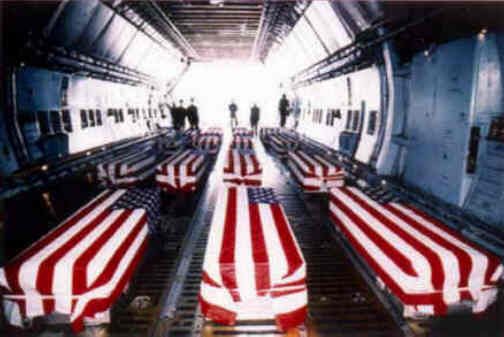












![Brotherhood" (2006) [TV-Series]](http://photos1.blogger.com/x/blogger2/1421/379621144723082/211/z/425926/gse_multipart33129.jpg)







No comments:
Post a Comment